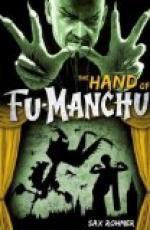“Twenty pounds, sir” answered the man promptly, “and I’d have done it for less, because I could see no harm in it, the prisoner being dead, and this his last request.”
“And who paid you?”
Now we were come to the nub of the matter, as the change in the man’s face revealed. He hesitated momentarily, and Colonel Warrington brought his fist down on the table with a bang. Morrison made a sort of gesture of resignation at that, and—
“When I was in the Army, sir, stationed at Cairo,” he said slowly, “I regret to confess that I formed a drug habit.”
“Opium?” snapped Smith.
“No, sir, hashish.”
“Good God! Go on.”
“There’s a place in Soho, just off Frith Street, where hashish is supplied, and I go there sometimes. Mr. Samarkan used to come, and bring people with him—from the New Louvre Hotel, I believe. That’s where I met him.”
“The exact address?” demanded Smith.
“Cafe de l’Egypte. But the hashish is only sold upstairs, and no one is allowed up that isn’t known personally to Ismail.”
“Who is this Ismail?”
“The proprietor of the cafe. He’s a Greek Jew of Salonica. An old woman used to attend to the customers upstairs, but during the last few months a young one has sometimes taken her place.”
“What is she like?” I asked eagerly.
“She has very fine eyes, and that’s about all I can tell you, sir, because she wears a yashmak. Last night there were two women there, both veiled, though.”
“Two women!”
Hope and fear entered my heart. That Karamaneh was again in the power of the Chinese Doctor I knew to my sorrow. Could it be that the Cafe de l’Egypte was the place of her captivity?
CHAPTER XXIV
CAFE DE L’EGYPTE
I could see that Nayland Smith counted the escape of the prisoner but a trivial matter by comparison with the discovery to which it had led us. That the Soho cafe should prove to be, if not the headquarters at least a regular resort of Dr. Fu-Manchu, was not too much to hope. The usefulness of such a haunt was evident enough, since it might conveniently be employed as a place of rendezvous for Orientals—and furthermore enable the cunning Chinaman to establish relations with persons likely to prove of service to him.
Formerly, he had used an East End opium den for this purpose, and, later, the resort known as the Joy-Shop. Soho, hitherto, had remained outside the radius of his activity, but that he should have embraced it at last was not surprising; for Soho is the Montmartre of London and a land of many secrets.
“Why,” demanded Nayland Smith, “have I never been told of the existence of this place?”




